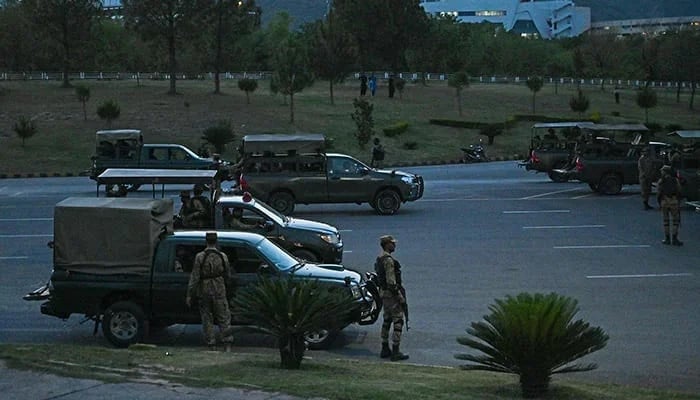The nexus of terrorism and delayed justice
Here’s a partial list of countries where terrorists are tried in military courts or tribunals: United States, United Kingdom, France, Israel, Egypt, Turkey, Algeria, Saudi Arabia, Yemen, Syria, Iraq, Russia, Bangladesh, Myanmar, Colombia, Nigeria, Kenya, Philippines and Sri Lanka. There exists a clear connection between terrorism and the delayed dispensation of justice.
The effectiveness of justice as a deterrent is maximized when the punishment for terrorist acts is both certain and severe. Swift and decisive justice conveys a resolute message to society at large, firmly establishing a stance of zero tolerance towards terrorism. With a clear understanding of the inevitable consequences, potential terrorists may be deterred from participating in such activities.
Pakistan serves as a prominent illustration, where prolonged legal proceedings and delays in cases related to terrorism have significantly undermined the deterrent effect. Exploiting the gaps in the justice system, terrorists strategize and carry out further attacks with increased impunity.
The deterrence theory is directly linked to the rational choice theory, suggesting that potential terrorists weigh the potential benefits and costs of their actions. If the perceived cost (punishment) outweighs the benefits (committing terrorist acts), individuals are less likely to engage in terrorism.
To be certain, protracted trials in Pakistan have yielded two discernible outcomes: prolonged public anxiety and fear.
Delayed justice in terrorist cases has meant degradation of witness testimonies, rendering it exceedingly challenging to secure convictions. An instructive example can be drawn from Iraq, where terrorism trials have been characterized by significant delays. Witnesses in these cases encounter security threats, resulting in alterations to their testimonies or a reluctance to testify altogether, thereby fostering an environment conducive to further acts of terrorism. In Egypt, prolonged detentions of suspected terrorists have been linked to the radicalization of individuals inside prisons, exacerbating the overall terrorism threat. Pakistan can draw valuable lessons from Nigeria, where, akin to the situation in Pakistan, the legal system grapples with a substantial backlog of cases.
The constraints in resources and efficiency impede the capacity to respond effectively to the ever-changing security landscape in both countries. If the United States, United Kingdom, France, Israel, Egypt, Turkey, Algeria, Saudi Arabia, Yemen, Syria, Iraq, Russia, Bangladesh, Myanmar, Colombia, Nigeria, Kenya, Philippines and Sri Lanka are employing military courts to address terrorism, the imperative for swift and decisive justice is undeniable.
The definite correlation between delayed justice and heightened security threats, must serve as a compelling cautionary tale. For Pakistan to take a proactive approach is imperative. Pakistan must ensure that justice becomes a potent deterrent against terrorism, safeguarding the nation and its people from the perils of prolonged insecurity.
-
 Savannah Guthrie Expresses Fresh Hope As Person Detained For Questioning Over Kidnapping Of Nancy
Savannah Guthrie Expresses Fresh Hope As Person Detained For Questioning Over Kidnapping Of Nancy -
 ByteDance Suspends Viral Seedance 2.0 Photo-to-voice Feature: Here’s Why
ByteDance Suspends Viral Seedance 2.0 Photo-to-voice Feature: Here’s Why -
 Tom Hanks Diabetes 2 Management Strategy Laid Bare
Tom Hanks Diabetes 2 Management Strategy Laid Bare -
 Bad Bunny Wins Hearts With Sweet Gesture At Super Bowl Halftime Show
Bad Bunny Wins Hearts With Sweet Gesture At Super Bowl Halftime Show -
 Why Angelina Jolie Loves Her 'scars' Following Double Mastectomy
Why Angelina Jolie Loves Her 'scars' Following Double Mastectomy -
 ‘World Is In Peril’: Anthropic AI Safety Researcher Resigns, Warns Of Global Risks
‘World Is In Peril’: Anthropic AI Safety Researcher Resigns, Warns Of Global Risks -
 Meghan Markle Receives Apology As Andrew Puts Monarchy In Much Bigger Scandal
Meghan Markle Receives Apology As Andrew Puts Monarchy In Much Bigger Scandal -
 Catherine O’Hara Becomes Beacon Of Hope For Rectal Cancer Patients
Catherine O’Hara Becomes Beacon Of Hope For Rectal Cancer Patients -
 Nancy Guthrie: Is She Alive? Former FBI Director Shares Possibilities On 10th Day Of Kidnapping
Nancy Guthrie: Is She Alive? Former FBI Director Shares Possibilities On 10th Day Of Kidnapping -
 Siemens Energy Profit Surges Nearly Threefold Amid AI Boom For Gas Turbines, Grids
Siemens Energy Profit Surges Nearly Threefold Amid AI Boom For Gas Turbines, Grids -
 TikTok's ByteDance To Develop Advance AI Chips With Samsung
TikTok's ByteDance To Develop Advance AI Chips With Samsung -
 Princess Beatrice, Eugenie In Dilemma As Andrew, Fergie Scandal Continues
Princess Beatrice, Eugenie In Dilemma As Andrew, Fergie Scandal Continues -
 Tumbler Ridge School Shooting Among Canada’s Deadliest — Here’s Where It Ranks
Tumbler Ridge School Shooting Among Canada’s Deadliest — Here’s Where It Ranks -
 Suspect Detained As Authorities Probe Nancy Guthrie’s Abduction
Suspect Detained As Authorities Probe Nancy Guthrie’s Abduction -
 Tumbler Ridge Tragedy: Nine Killed, 25 Injured After School Shooting In British Columbia
Tumbler Ridge Tragedy: Nine Killed, 25 Injured After School Shooting In British Columbia -
 FDA Sends 'refusal-to-file' To Moderna Over New Flu Vaccine
FDA Sends 'refusal-to-file' To Moderna Over New Flu Vaccine




